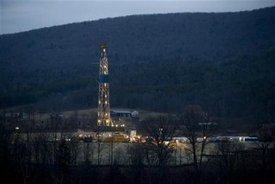Fracking Poisoning Families at Alarming Rate: Report
Residents living near gas fracking sites suffer an increasingly high rate of health problems now linked to pollutants used in the gas extraction process, according to a new report released Thursday.

A natural gas well is drilled near Canton, in Bradford County, Pennsylvania January 8, 2012. Leading area in fracking Marcellus shale in the Northeastern United States (Reuters) The study, conducted by Earthworks’ Oil & Gas Accountability Project, pulled from a survey of 108 Pennsylvania residents in 14 counties, and a series of air and water tests. The results showed close to 70 percent of participants reported an increase in throat irritation and roughly 80 percent suffered from sinus problems after natural gas extraction companies moved to their areas. The symptoms intensify the closer the residents are to the fracking sites.
"We use water for nothing other than flushing the commode," said Janet McIntyre referring to the now toxic levels of water on her land, which neighbors a fracking site. McIntyre said her entire family, including their pets, suffered from a wide array of health problems including projectile vomiting and skin rashes, indicative of other families' symptoms in the areas surveyed. Other symptoms include sinus, respiratory, fatigue, and mood problems.
"Twenty-two households reported that pets and livestock began to have symptoms (such as seizures or losing hair) or suddenly fell ill and died after gas development began nearby,” the report finds.
After taking water and air samples, Earthworks detected chemicals that have been linked to oil and gas operations and also directly connected to many of the symptoms reported in the survey on the resident's properties. This study showed a higher concentration of ethylbenzene and xylene, volatile compounds found in petroleum hydrocarbons, at the households as compared to control sites.
“For too long, the oil and gas industry and state regulators have dismissed community members’ health complaints as ‘false’ or ‘anecdotal’,” said Nadia Steinzor, the project’s lead author. “With this research, they cannot credibly ignore communities any longer.”
According to a separate report released earlier this month, EPA regulators are having trouble keeping up with the "rapid pace" of shale oil and gas development, due to a lack in resources, staff, data and a number of legal loopholes.